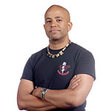Minister Faust's Blog, page 4
November 22, 2017
THE DREAM WARRIORS – LEGENDARY CANADIAN HIP HOP CREW ON UNCOMPROMISING CULTURE AND THE COUNTER-STEREOTYPICAL REALITY OF FANBOY HIP HOP HEADS (MF GALAXY 144)

WHY DREAM WARRIORS ALBUM COVERS DIDN’T FEATURE CARS OR SCANTILY-CLAD DANCING WOMEN, WHY MANY ARTISTS AND FANS DON’T REVEAL THEIR TRUE SELVES AND PASSIONS
LISTEN/DOWNLOAD
Back in the late 80s and early 90s, even though there were artists across the country, the Canadian hip hop recording and video industry was centered on Toronto, and the three giants were Maestro Fresh Wes, Michie Mee, and this episode’s guests, The Dream Warriors.
The Dream Warriors included Toronto’s King Lou and Capital Q, and for the second album Subliminal Simulations added DJ Luv and also the rapper Spek from Montreal. Their top hits included “Wash Your Face in My Sink” and “Ludi,” and along the way members collaborated with Michie Mee, MC Lyte, Maestro, Lillian Allen, Messanjah, Butterfly from Digable Planets, and Gang Starr. They also recorded “Man Smart, Woman Smarter” for the soundtrack to the movie Buffy the Vampire Slayer.
Even though Buffy the movie was far from the pop culture icon that the TV series became, the crossed paths of Buffy and the Dream Warriors makes sense today. The Dream Warriors weren’t interested in rapping about many of the fixations of the early 1990s—no degradation of African women; no celebration of the murder of African men.
Instead, the albums contained enigmatic wordplay, references to fan culture including role playing games, Warlock comics, and Star Wars, and Canadian pop references such as their unforgettable hit, using a sample from the theme song to the long-running Canadian game show Definition, a song written by the great composer Quincy Jones. It’s called “My Definition of a Boombastic Jazz Style.”
While the band released a third album called The Master Plan, that 1996 recording wasn’t published in the US. Spek and DJ Luv both left the group in 1997; the 2002 album The Legacy Continues saw distribution in Canada only. But for fans of the Canadian hip hop scene, the band will live forever.
In the fall of 1994 the group was touring Canada to promote their second album, Subliminal Simulations. The group spoke with me by telephone from Toronto and I recorded our conversation at CJSR FM-88 Edmonton for The Terrordome and The United Nation of Hip Hop, my radio shows of the time. We discussed:
Reactions to Subliminal Simulations’ new musical directionsThe importance of embracing other cultures without rejecting one’s ownThe counter-stereotypical reality of young African-Canadians in the 1980s and 90s who loved comics, science fiction, and RPG board games as much as they loved hip hopWhy Dream Warriors album covers didn’t feature cars or scantily-clad dancing women, which was a typical look for the time, andWhy many artists and fans don’t reveal their true selves and passions
My Definition of a Boombastic Jazz Style
SUBSCRIBE FOR FREE ON iTUNES
SUBSCRIBE FOR FREE ON iHEARTRADIO
SUBSCRIBE FOR FREE ON PLAYER FM
SUBSCRIBE FOR FREE ON STITCHER
SUPPORT MF GALAXY ON PATREON
FOR MORE INFORMATION + LINKS
Published on November 22, 2017 18:44
October 19, 2017
October 18, 2017
CHAKA ZINYEMBA, RISING STAR OF MBIRA, THE MUSICAL INSTRUMENT OF ZIMBABWEAN SPIRITUALITY AND REVOLUTION (MF GALAXY 143)
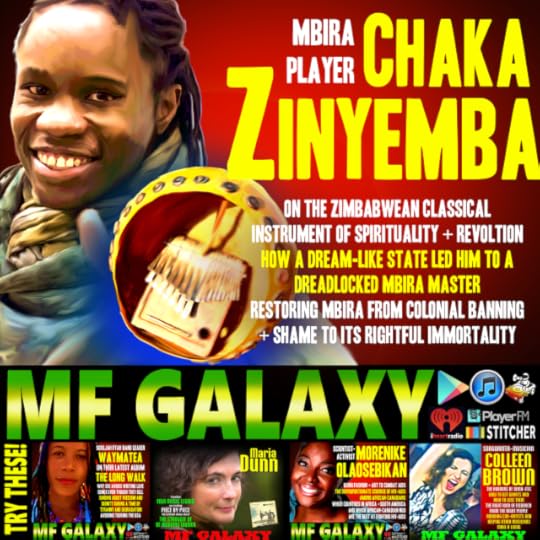
HOW A DREAM-LIKE STATE LED HIM TO A DREADLOCKED MBIRA MASTER; CREATING HIS DEBUT ALBUM WITH HIS COUSIN; ON MBIRA GREATS THOMAS MAPFUMO AND CHIWONISO MARAIRE; RESTORING MBIRA FROM COLONIAL MINDSETS TO ITS IMMORTAL GREATNESS
LISTEN/DOWNLOAD
What is the Zimbabwean musical instrument called the mbira? It’s a wooden resonator box with metal keys, called kalimba in Cameroon and thumb piano in the West, although “chime-box” offers a better description of the instrument’s sound. Its pristine voice is perfectly suited to cathedrals, ancient caves, and modern concert halls. But the origins of the mbira are lost in the mists of time.
Westerners who know mbira most likely do so from the work of Zimbabwe’s Thomas Mapfumo, a fusion musician who helped resurrect the mbira which the British colonial dictatorship had banned because of its religious and cultural gravity. Mapfumo’s chimurenga (struggle) style was a cultural-nationalist concoction that changed modern Zimbabwean music, seizing it back from its own Euro-American aesthetic occupation.
But today’s guest has a different path to and with the mbira. It’s not often a musician tells you an origin story that sounds like a quest straight out of the pages of an Africentric epic fantasy novel. But that’s the scenario that Edmonton’s Chaka Zinyemba unfurled about how he discovered and later learned to play the mbira, the leading instrument of Zimbabwe’s classical music. I’ll let him tell you that story, and about his royal lineage, in just a moment.
In 2012, Chaka Zinyemba released his debut album Tariro with his cousin Freemantle Nhembo playing bass mbira and hosho (or maracas). Both provided vocals. Zinyemba played traditional songs using mbirahuru (great mbira), also called mbirahurudzavadzimu (the great mbira of the ancestors). That instrument was once used particularly during Shona religious ceremonies (or mapira) which often lasted through the night, the mbira music lifting people into a hypnotic, ecstatic state.
Zinyemba’s album Tariro is a beautiful, sensitive, soulful album. Hearing it, one feels the caress of the clouds and tastes the shimmer of moonlight. You can find the album on BandCamp and iTunes and probably elsewhere.
When I spoke with Zinyemba in February 2012, he told me had no plans to become a full-time musician; back then he was studying Human Geography at the University of Alberta in Edmonton with a minor in Music and a focus on disaster management, health planning, and urban planning. He also volunteered with the Kenyan Red Cross. But he did hope to collaborate with other musicians and develop spoken word albums featuring his musicianship.
Let’s hear all about his music, his plans, and his history of the mbira and its music in my conversation with Chaka Zinyemba on MF GALAXY.
LISTEN/DOWNLOAD
Chaka Zinyemba on BandCamp, where you can also inquire about mbira lessons
Chaka Zinyemba and the Mbira Renaissance Band
Chaka Zinyemba mini-concert for CKUA
Chaka Zinyemba: Totemism in the 21st Century
Documentary: Mbira - Spirit of the People (Thomas Mapfumo, Oliver Mtukudzi)
Thomas Mapfumo unplugged: Kuenda
Chiwoniso Maraire
Chiwoniso Maraire: “In This Life”
How to Play the Kalimba & Mbira
Electric Kalimba – EH Bass micro synth by Psychiceyeclix
SUBSCRIBE FOR FREE ON iTUNES
SUBSCRIBE FOR FREE ON iHEARTRADIO
SUBSCRIBE FOR FREE ON PLAYER FM
SUBSCRIBE FOR FREE ON STITCHER
SUPPORT MF GALAXY ON PATREON
FOR MORE INFORMATION + LINKS
Published on October 18, 2017 14:15
NATASHA DEEN ON HOW PSYCHOLOGY CAN MAKE YOU A BETTER WRITER, HOW WRITING YA CAN MAKE YOU SELL MORE BOOKS IN ANY GENRE, HOW WRITING CAN MAKE YOUR PHYSICALLY AND MENTALLY HEALTHIER (MF GALAXY 140)

THE NEW FICTION CATEGORY THAT MIGHT BE YOUR BEST WRITING AND MARKETTING NICHE; THE POWER OF NAMES: FROM PEN NAMES TO THOSE STOLEN FROM HER ANCESTORS; HOW YOUR YA WRITING CAN HELP KIDS BECOME SUPERHEROES
LISTEN/DOWNLOAD
Natasha Deen is pretty awesome. She’s a YA and children’s writer who’s written more than a dozen books, including The Not So Secret Case Files of Billy Vale, P.I., the Guardian series, and the Retribution series. She criss-crosses Canada teaching new writers and visiting classrooms, and she’s won a string of accolades including nominations for the Sunburst and the Alberta Readers’ Choice Award and wins for the Moonbeam, CCBC Best Pick for Kids and Teens.
Readers keep coming back for her mix of mystery, action, horror, and humour, some of which arise from her own real-life experiences, and teachers keep booking her because her workshops and teaching guides offer genuine value.
Deen met with me at the food court of Westmount Mall in Edmonton on September 26, 2017. She discussed:
How studying psychology can help you become a better writer and the major insight it gave her into herselfWhat makes YA different from other niches, how it can change lives, and how writing it can make you sell more books in any categoryThe new fiction category that might be your best writing and marketting nicheThe power of names: from pen names to those stolen from her ancestorsHow writing can make you physically and mentally healthierHow your YA writing can help kids become superheroes
natashadeen.com
SUBSCRIBE FOR FREE ON iTUNES
SUBSCRIBE FOR FREE ON iHEARTRADIO
SUBSCRIBE FOR FREE ON PLAYER FM
SUBSCRIBE FOR FREE ON STITCHER
SUPPORT MF GALAXY ON PATREON
FOR MORE INFORMATION + LINKS
Published on October 18, 2017 14:10
September 28, 2017
WES BORG ON WHY YOU HAVE TO SUCK AT WRITING, WHY IMPROV MAKES YOU A BETTER WRITER, HOW A HIGH SCHOOL IMPROV TRAINING PROGRAMME IS FAILING A GENERATION OF WOULD-BE IMPROVISORS (MF GALAXY 141)
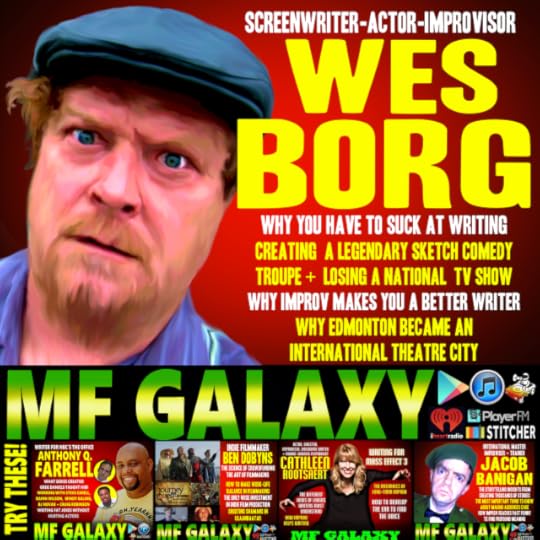
CREATING A LEGENDARY SKETCH COMEDY TROUPE + LOSING A NATIONAL TV SHOW, WHY EDMONTON BECAME AN INTERNATIONAL THEATRE CITY
LISTEN/DOWNLOAD
Wes Borg is a legend. In the 1980s he cofounded the influential sketch comedy troupe Three Dead Trolls in a Baggie. He’s written widely for the screen, beginning with the Three Dead Trolls in a Baggie television series, and moving to the 2003 TV movie The Western Alienation Comedy Hour, serving as head writer on the 2004 series The Geek Show, and creating the short film Café Utopia.
He’s also appeared on CBC Radio’s The Debaters and The Irrelevant Show. He wrote the comedy songs “The War of 1812” and “Toronto Sucks” even though people often attribute them to The Arrogant Worms. He co-wrote Piledriver! with Darrin Haggin and Ha! with Chris Craddock, and The War of 1812 with Paul Mather, and he’s acted in various BioWare games including the Mass Effect trilogy and Jade Empire.
He’s received two Elizabeth Sterling Haynes Awards for his participation in the Trolls shows Kevin Costner's Naked Butt and Skippy Gets a Boner, and a Bronze Medal in the Calgary Winter Olympics Theatre Sports Tournament in 1988. In 2014 he was nominated as "Best Variety Act" in the Canadian Comedy Awards, and won "Top Improv/Sketch or Variety Performer" from Victoria's "Monday Magazine,” and was named Victoria’s Favourite Comedy Performer two years in a row.
On November 25, 2014 Borg spoke with me by Skype from his home in Victoria, and explained:
Why you have to suck at writingWhat it’s like to create a legendary sketch comedy troupe and then lose the national TV show produced for itWhy improv makes you a better writerHow a high school improv training programme is failing a generation of would-be improvisers, andWhy Edmonton became an international theatre cityAlong the way, Borg cites the Fringe, meaning the Edmonton International Fringe Festival, which is the second-largest small theatre festival on the planet, and Cathleen, meaning Cathleen Rootsaert, one of the co-founders of Three Dead Trolls in a Baggie. He also refers to GST, which for US listeners is the federal sales tax which was a new experience for Albertans who to this day do not pay provincial sales taxes.
You can find him on Twitter @deadtroll.
SUBSCRIBE FOR FREE ON iTUNES
SUBSCRIBE FOR FREE ON iHEARTRADIO
SUBSCRIBE FOR FREE ON PLAYER FM
SUBSCRIBE FOR FREE ON STITCHER
SUPPORT MF GALAXY ON PATREON
FOR MORE INFORMATION + LINKS
Published on September 28, 2017 10:14
MICHAEL DORN AND A BUNCH OF WRITERS ON THE MEANING OF WORF: THE OVERCOMPENSATOR, THE UNFULFILLED, THE LOVER, THE ALIENATED, THE HUMAN (MF GALAXY 140)
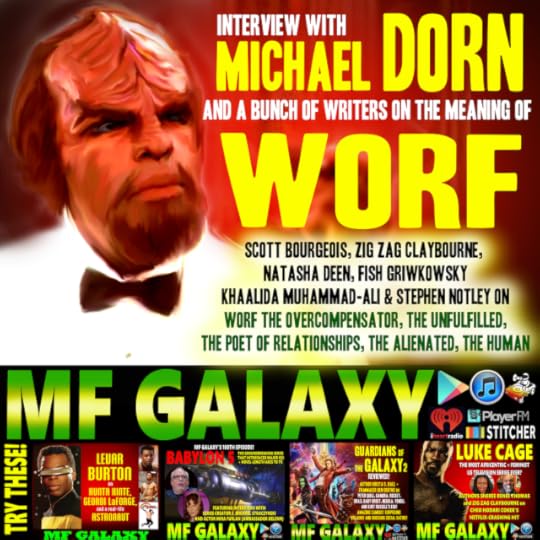
SCOTT BOURGEOIS, ZIG ZAG CLAYBOURNE, NATASHA DEEN, FISH GRIWKOWSKY, KHAALIDA MUHAMMAD-ALI AND STEPHEN NOTLEY ON THE MOST LOVABLE KLINGON EVER
LISTEN/DOWNLOAD
Full disclosure: I grew up watching the original Star Trek in re-runs. Star Trek: The Next Generation debuted the first year I went to university, and it was a major disappointment in many ways, but especially for how it handled Klingons: how they behaved and whom they represented.
Mostly they behaved as obnoxious, single-minded, bloodthirsty brawlers, to be avoided and feared, mostly artless and without sophistication, and to be laughed at for their pompous seriousness and quaint and disgusting customs. Despite growing up among humans, Worf is such an idiot that with august earnestness he calls prune juice a “warrior’s drink.” He’s so violent and stupid that in the Next Generation pilot episode “Encounter at Farpoint” he aims a phaser pistol at the bridge viewscreen when the bad guy Q appears on it because he apparently doesn’t know what TV is.
Another Klingon is so egotistical and stupid that he attempts to headbutt Data, an nearly indestructible android, and knocks himself unconscious. Klingons are so gross that they eat worms and drink blood wine. They are obsessed with killing and dying. In other words, on a show whose fans like to claim it as universalist and anti-racist, the writers spent a great deal of time depicting Klingons in a way that, had they been Chinese, Nigerians, or Mexicans, would have been instantly dismissed as racist.
And that’s the other thing. Whereas the Klingons in the original series were a completely obvious analogue for the Soviet Union, and were all played by European actors, in the Next Generation era, Klingons were partially post-glory-days Russians, but also Muslims… and also African-Americans, especially Worf, who was not only not raised by Klingons, but raised by White Earth people, kind of like Arnold Jackson from Diff’rent Strokes or Webster from Webster.
Now I’m not saying that every member of the audience saw Worf that way, but clearly plenty did, and actor Michael Dorn is an African-American, and so were a disproportionate number of the other actors who played Klingons, that parallel seemed all the more available. So while the show was a bonanza for African-American actors seeking work, depicting the Klingons as violent, subhuman morons became an ever bigger problem.
So I might have chucked the whole enterprise, so to speak, except for a first season episode of Star Trek: The Next Generation called “Heart of Glory.” In that episode, written by Maurice Hurley, Herbert Wright, and D.C. Fontana, Worf breaks out as the single most provocative character on the series. While confronting renegade Klingons, he must confront his own place as the most alienated crew member on the USS Enterprise. Worf must decide whose kinship matters to him most, and why—and while the deck is stacked against the Klingon renegades, they are treated as characters with dignity, and so is Worf.
While The Next Generation thrived during its peak seasons three and four, again and again the shows featuring Worf stood out as, for me and many others, its most fascinating. After TNG wrapped production, Michael Dorn and his character joined the production of Star Trek: Deep Space Nine, where again many of my favourite episodes focused on the galaxy’s loneliest Klingon. The always-excellent Dorn also brought subtle and dry humour to The Next Generation which sorely lacked it.
Around 1992 in Edmonton, I met Michael Dorn at a science fiction convention, and my friend Fish Griwkowsky was there to photograph the chance-encounter and the interview that followed. I say “chance encounter” because I was making a call to my friend Steve Notley from a payphone near the parkade just as Dorn was walking in. I said, “Michael?” He looked up and boomed “Yes?” and I hung up on Steve and asked for an interview. So in today’s episode you’ll hear that interview, and also the reflections of several writer friends on what Worf means to them, including:
Scott Bourgeois on Worf as the self-doubting cultural overcompensatorKhaalida Muhammad-Ali on Worf’s aching and unfulfilled quest for happinessZig Zag Claybourne on Worf as the navigator of poetical relationshipsFish Griwkowsky on Worf’s essentialist claims about KlingonsNatasha Deen on Worf the alienated stand-in for cultural or racial hybrids everywhere, andStephen Notley on the terrible trope of the Worf effect and how writers eventually sexualized and “humanised” Worf for the better and made him into one of Star Trek’s most pivotal characters.Along the way you’ll hear excerpts from a supercut by YouTuber tarnationsauce2 called “Worf gets DENIED again and again on Star Trek TNG” which will help demonstrate how often the writers and producers failed to use Worf properly, casting him as the security chief who constantly gets beaten up and whom pretty much everyone overrules about everything, every time.
Worf gets DENIED again and again on Star Trek TNG
By tarnationsauce2
Worf: A failure at everything
SUBSCRIBE FOR FREE ON iTUNES
SUBSCRIBE FOR FREE ON iHEARTRADIO
SUBSCRIBE FOR FREE ON PLAYER FM
SUBSCRIBE FOR FREE ON STITCHER
SUPPORT MF GALAXY ON PATREON
FOR MORE INFORMATION + LINKS
Published on September 28, 2017 10:07
ROBERT FISK ON OSAMA BIN LADEN + HOW AL QAEDA’S MURDER-IN-CHIEF LIVED LONG ENOUGH TO SEE HIS OWN IRRELEVANCE; WHY US CYBER-SPYING THE MUSLIM WORLD IS USELESS; THE GREATEST DIFFERENCE BETWEEN EAST AND WEST (MF GALAXY 139)

WHY JOURNALISTS HAVE SUCH A PERVERTED VIEW OF HISTORY AND POLITICS
LISTEN/DOWNLOAD
In the world of journalism, Robert Fisk is a rock star not just for the “songs” he’s written but for the people he’s shared the stage with, including Saddam Hussein, Ayatollah Khomeini, and Osama Bin Laden, whom he interviewed three times. Based in Beirut since 1976, Fisk currently writes for London’s Independent, and over four decades he’s covered the Iranian Revolution, the Lebanese civil war, the USSR’s occupation of Afghanistan, and virtually every war or conflict in West and Central Asia.
Having authored five books including his classic Pity the Nation: Lebanon at War, and having received more British and international awards than any other English-language journalist, Fisk frequently defines his role not to “write the first draft of history,” but, by quoting Israeli journalist Amira Hass, “to monitor the centres of power.”
A few years ago Robert Fisk was touring Canada on behalf of Canadians for Peace and Justice in the Middle East. On January 31, 2013, I spoke with Fisk at the Union Bank Hotel in Edmonton before he addressed the University of Alberta’s International Week, delivering a talk called “Arab Awakening, But Are We Hearing the Truth?” The day before he arrived, Russia and Iran claimed that Israel had bombed Syria, with CBC claiming the target was an arms convoy headed to Lebanon.
In today’s episode of MF GALAXY, Robert Fisk discusses:
The posturing and transparent face-saving of Middle Eastern governments following Israeli air strikesWhy the Israeli military doesn’t want war with Iran, whatever the Israeli government saysWhat Osama bin Laden was like in person and how far Fisk was willing to push Al Qaeda’s murderer-in-chief during an interviewHow Bin Laden reacted during the Arab Spring to seeing that his personality and programme were irrelevant to the overwhelming majority of ArabsWhy Bin Laden eventually supported allying his supporters with the remnants of Iraq’s Baath party, which he’d always opposed and despisedWhy France invaded Mali and who was fighting its governmentWhy US intelligence can’t make adequate use of the giant amount of electronic surveillance it performs on the Muslim worldWhy journalists have such a short memory of history that perverts their view of contemporary politics, andWhat he thinks is the greatest and most beguiling difference between the global European empire and the remnants of the Islamic one in the eastAlong the way, Fisk mentions Timbuktu, one of the most famous and ancient cities in the world, an historic seat of learning and wisdom in Mali. Note that Fisk spoke with me just a few months before DAESH, known in the West as ISIL or the IS, declared itself to be a state or Caliphate. Fisk also uses the Arabic word “mahdi” which means, essentially, the prophesied final redeemer before the end of the world.
Finally, while discussing Bin Laden’s claim that the United States was heading towards civil war, Fisk recounts that he told the fanatic to his face that his idea was “rubbish.” Chillingly, the chief jihadi’s prediction no longer seems so unbelievable.
SUBSCRIBE FOR FREE ON iTUNES
SUBSCRIBE FOR FREE ON iHEARTRADIO
SUBSCRIBE FOR FREE ON PLAYER FM
SUBSCRIBE FOR FREE ON STITCHER
SUPPORT MF GALAXY ON PATREON
FOR MORE INFORMATION + LINKS
Published on September 28, 2017 10:01
MORENIKE OLAOSEBIKAN ON DISPROPORTIONATE SCOURGE OF HIV-AIDS AMONG AFRICAN-CANADIANS; HOW SHE USED FASHION + ART TO COMBAT THE AIDS PANDEMIC; WHICH AFRICAN/SOUTH AMERICAN COUNTRIES + AFRICAN-CANADIAN NGO ARE THE BEST AT FIGHTING HIV-AIDS (MF GALAXY 138)
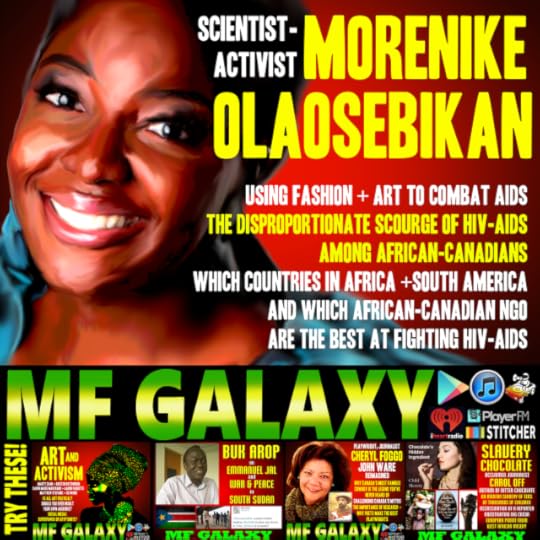
WHY FIGHTING HIV-AIDS FORCES A CONFRONTATION WITH RELIGIOUS VALUES, CULTURAL NORMS, THE EDUCATION SYSTEM, AND THE POVERTY-TO-PRISON PIPELINE; HOW TRADITIONAL RURAL LEADERS AND CLERGY ARE JOINING THE STRUGGLE TO PROTECT THOSE WHO HAVE HIV AND PREVENT OTHER
LISTEN/DOWNLOAD
As shocking as it is in 2017, HIV-AIDS disproportionately afflicts African-Canadians in Alberta. The reasons are varied and complex, which means fighting the pandemic here is all the more difficult. But the reality is that in this province, African-Canadians are six times more likely to be living with HIV-AIDS than the general population, and comprise 26 percent of all new HIV infections despite being only 2.5 percent of the population.
While some people might want to avoid the subject due to stigma or mortal fear, my guest today isn’t one of them, and she’s dedicated her life to stopping new infections and helping those already afflicted.
Morenike Olaosebikan is a health scientist and the founder of Ribbon Rouge, which uses fashion and the arts to raise money to fund relief and treatment for those affected, and to educate and empower those most vulnerable so they can avoid being infected, or share their human experience through the arts if they have already been affected. The Ribbon Rouge project is more than a decade old and has raised tens of thousands of dollars to help those living with the human immunodeficiency virus.
In today’s episode of MF GALAXY, Morenike Olaosebikan discusses:
The hidden and disproportionate scourge of HIV-AIDS among African-Canadians in AlbertaWhy and how she uses fashion and art to combat the AIDS pandemicWhy fighting HIV-AIDS forces a confrontation with religious values, cultural norms, the education system, and the poverty-to-prison pipelineWhich African country, which South American country, and which African-Canadian NGO are doing the some of the best work in the battle against HIV-AIDS, andHow traditional rural leaders and clergy are joining the struggle to protect those who have HIV and prevent others from getting itWe spoke on August 25, 2017 at downtown Edmonton’s Camel Boyz Somali restaurant.
RibbonRouge.com
Profiles on Morenike Olaosebikan
woman.ng/2017/07/morenike-olaosebikan-advocating-social-justice-zero-hiv-ribbon-rouge
morenike.co/tag/morenike-olaosebikan
blackcanadians.com/morenike-olaosebikan
Published on September 28, 2017 09:56
MASS EFFECT’S MARK “COMMANDER SHEPARD'' MEER ON THE ART OF VIDEO GAME ACTING, WHICH HOLLYWOOD STAR LOVES COSPLAY AS MUCH AS HE DOES, AND THE MOST IMPORTANT CONCEPTS FOR EXCELLING AT IMPROV (MF GALAXY 137)
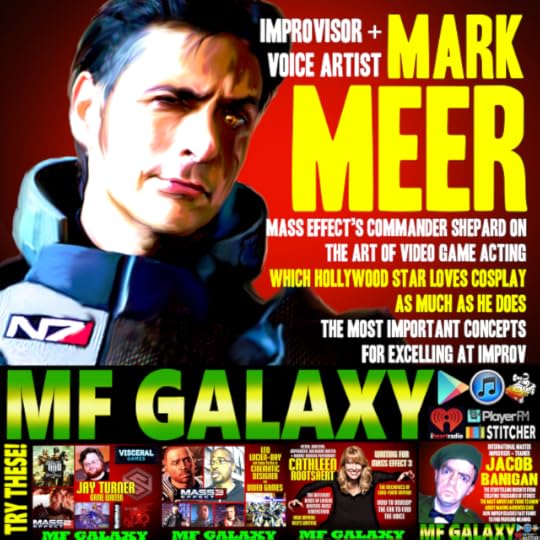
GOING TO CONS IN COSTUME, WHICH CHARACTERS ARE HIS FAVOURITES FOR COSPLAY, WHY IMPROV IS SO VALUABLE FOR ANY ACTOR BUT ESPECIALLY FOR VIDEO GAME WORK
LISTEN/DOWNLOAD
Mark Meer is possibly the most affable fellow in showbiz. He’s a terrific stage actor, voice artist, and improviser, and I’ve known him since we were both cartoonists at university and worked together in the sketch comedy troupe The 11:02 Show. He’s best known as the voice of Commander Shepard from BioWare’s Mass Effect trilogy and has done other video games including Gods of Rome and Baldur’s Gate: Enhanced.
And he’s not just someone whom fans love—he’s a fanboy himself, and attended numerous conventions in costume. He’s literally a pro at cons. He’s also appeared in short films such as Tar Zombies Barbecued and Flight of the Polar Bear; and he’s been a stalwart of the Edmonton theatre community for decades in ongoing longform improv such as Die-Nasty! and Gordon’s Big Bald Head. And if that weren’t enough, many radio listeners in Canada and the US know him as one of the actors in The Irrelevant Show.
In today’s episode of MF GALAXY, Mark Meer and I discuss:
How video game acting differs from other types of actingWhy there is no definitive version of Mass Effect’s Commander ShepardWhy improv is so valuable for any actor but especially for video game workThe most important concepts one must internalise to excel at improvHow he gets such outstanding costumes to wear to conventions, which characters are his favourites for cosplay, and which friend and Hollywood star loves cosplay as much as he doesWe spoke at Meer’s home in Edmonton’s theatre-arts district on July 4, 2017.
SUBSCRIBE FOR FREE ON iTUNES
SUBSCRIBE FOR FREE ON iHEARTRADIO
SUBSCRIBE FOR FREE ON PLAYER FM
SUBSCRIBE FOR FREE ON STITCHER
SUPPORT MF GALAXY ON PATREON
FOR MORE INFORMATION + LINKS
Published on September 28, 2017 09:51
DAVID CLIMENHAGA ON FILDEBRANDT SCANDAL-CLUSTER + HATEYOUTAINMENT IMPLOSION (MF GALAXY 136)

CHIEF ACCUSER FROM UNITED CONSERVATIVE PARTY + CANADIAN TAXPAYERS FEDERATION MEET HIT-AND-RUN + AIR B-N-B OFFENSES; FILDEBRANDT’S FALL WAS INSIDE JOB; TRUMPIAN GAME OF HATE POLITICS
LISTEN/DOWNLOAD
When the New Democratic Party of Alberta formed a majority government in 2015, I quipped that night that Alberta had just become a Western democracy. After all, it was the first time in forty years that the governing Progressive Conservative Party had been voted out.
But my joke depressed me. After all, it’s just not normal or healthy for any jurisdiction, let alone one of two economic engines of a G-7 liberal democracy, to be shackled to any one party for almost half a century. My joke depressed me because it meant we were just a petro-state. But hey, even Alaska under Sarah Palin paid higher oil royalties to its citizens than Conservative Alberta did. What is up with that?
But two years into the NDP’s first provincial government, the devastated PC party and the official opposition Wild Rose party have merged under the slogan “Unite the Right.” Yep, that slogan. Just a coincidence? Sure… and yet as it turns out, if you drew a Venn diagram of the US “Unite the Right” constituency and that of the Wild Rosers, you’d find at the centre many of the same type of toxically racist, sexist, anti-queer, anti-Muslim, anti-Jewish media personalities, shadowy funders, and gun fanatics. In some cases, you’d find the exact same people on both sides of the border.
In Alberta, the Unite the Right merger produced the United Conservative Party, which turns into the great acronym UCP, or as some apparently want it to be “u-kip,” to sound like the United Kingdom Independence Party that created Brexit and emboldened racists across Britain.
There are two front-runners for the leadership of the UCP: former Wild Rose leader Brian Jean, and former PC leader Jason Kenney. Both have enjoyed the attention that ultra-right-wing Canadian media has given them. Days after the racist torchlight rally and terrorist attack in Charlottesville, Brian Jean and Jason Kenney each stated they would no longer appear on one far-right site in particular, but neither explained why they’d appeared on it for years throughout its constant Islamophobic publication.
Another firebrand of the UCP and beneficiary of right wing media, legislator Derek Fildebrandt, is now formerly of the UCP. Just recently he resigned from the brand-new caucus as the result of three scandals: double-dipping on meal reimbursements, profiting from his taxpayer-financed housing by offering it on Air B-n-B, and doing a hit-and-run on a neighbour’s car.
Fildebrandt has always been a fiery figure—if not a lake of fiery figure—in that movement, and his work in the Canadian Taxpayers Federation combined with his recent spending and profiting has rubbed many folks raw. What does his future hold? Will the UCP welcome him back in time for the next election?
Joining me to analyse all the above is David Climenhaga, who is “an award-winning journalist, author, post-secondary teacher, poet, and trade union communicator who has worked in senior writing and editing positions at the Toronto Globe and Mail and Calgary Herald. He holds a Master’s Degree in Journalism from the Carleton University School of Journalism in Ottawa. His 1995 book, A Poke in the Public Eye, explores the relationships among Canadian journalists, public relations people and politicians.” Climenhaga blogs at AlbertaPolitics.ca.
We spoke last week on August 16, 2017 at Climenhaga’s office in downtown Edmonton. Full disclosure: I have volunteered for the provincial and federal New Democratic Party, and have also provided paid public speaking training for some of its members.
SUBSCRIBE FOR FREE ON iTUNES
SUBSCRIBE FOR FREE ON iHEARTRADIO
SUBSCRIBE FOR FREE ON PLAYER FM
SUBSCRIBE FOR FREE ON STITCHER
SUPPORT MF GALAXY ON PATREON
FOR MORE INFORMATION + LINKS
Published on September 28, 2017 09:46


